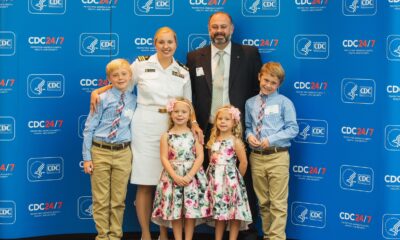Education
Paul Duke STEM High School Teacher Beckie Fischer talks about her NASA Experience
Published
5 years agoon
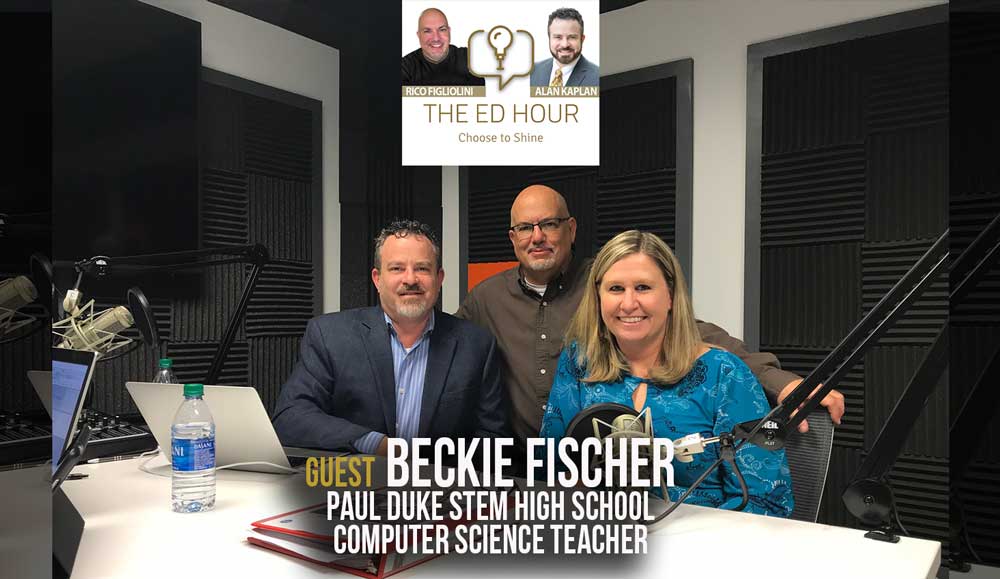
The ED Hour is back with an exciting episode with computer science teacher from Paul Duke STEM High School, Beckie Fischer. Beckie recently got accepted into an elite program to take a behind the scenes look at the programs at NASA. She’s here, along with our hosts Rico Figliolini and Alan Kaplan, to share everything she learned about this exciting program and how it works into her teaching.
Resources:
https://www.nasa.gov/centers/johnson/stem/educators/index.html
There are some really neat lessons you can do in your classroom that help you bring home what it is that, you know, the space missions are all about… We basically just did a lot of hands on interactive activities with the NASA engineers to help us bring it home to our students, so that they understand it better.
Beckie Fischer
Rico: [00:00:30] Hi everyone. This is Rico Figliolini host of Peachtree Corners Life, but we have the Ed Hour today and I’m with host Alan Kaplan and it’s, yeah, there’s a, there’s a seven-second delay on this thing, but we’re here. Yes. Gotta love it. So by way of introduction, we are in a technology hub here in the city of Peachtree Corners, and we’re actually doing this podcast from Atlanta Tech Park in the city of Peachtree Corners at Tech Park Atlanta. It’s actually along the road of the autonomous vehicle track that’s known as Curiosity Lab at Peachtree Corners. It’s a place that we have this, this area is 5g, Sprint 5g compatible now throughout this whole tech park, and that’s the reason why this will be a hub for autonomous vehicles and smart city work through this live living lab. Because self-driving cars can come through this place where people are crossing roads, where there’s streetlights, where everything is an active real-life community. So look out for those, those autonomous vehicles. But we’re working out of this podcast room here, and I appreciate Atlanta Tech Park for providing this to us. Alan, tell us a little bit about the Ed Hour.
Alan: [00:01:40] Sure. Rico, it’s great to be back with you here on the Ed Hour. Excited that for those of you rejoining us, and if you’re viewing our show here for the first time, the purpose of the Ed Hour is to open the doors of our schools to the community so that the community can see the wonderful things that are happening there. The accomplishments of our teachers, the great things our students are doing, and the wonderful things happening in our schools every day. So glad to be able to bring this back.
Rico: [00:02:07] We have a special guest today too. A teacher from Paul Duke STEM high school. She’s a computer science teacher. She had a great experience during the summer. We’ll let her explain that. But this is one of the reasons why she’s here because it ties in so well to Paul Duke STEM high school. So Becky Fisher, I appreciate you coming on the show.
Becki: [00:02:25] Thank you. I was, looking online one day cause I’m very interested in getting a Raspberry PI lab going at my school and I was trying to find some ways that, we could, do like a coding club with Raspberry PIs. So I found out that they had this competition with Raspberry PIs on the space station actually, but the competition is only eligible in some countries in Europe. So I was really disappointed that I wasn’t able to get involved with that. But they actually do experiments and they run code on these Raspberry PIs on the space station the students do. So in looking into this further, I just on a limb it was, you know, close to the deadline to apply for this. I just said, let me just try this out and let me apply for this NASA experience. And about two weeks later I was accepted and I was just like beside myself because apparently there was over 500 applicants and they take 50 each summer. So, being a computer science teacher, this was kind of newly opened up to computer science teachers. It’s, usually, a lot of more science teachers that are doing it because they learn about all the ways that the science field is, being used in NASA. but they’re are opening up more to the math majors and computer science. And so I got accepted and I was able to bring back a lot to all the fields at my school. And I actually have some stuff to share with some of the other teachers.
Alan: [00:03:48] Awesome. Well Becki, so we’re here to learn about your experience there. First we’d like to learn a little bit more about you, and leading up to this. So you’re a computer science teacher at Paul Duke, can you tell us a little bit how you got involved in your, your background in computer science before being at Paul Duke, and just kind of share that with us?
Becki: [00:04:04] I’ve always been, really good with math and logic and, I wanted to go into computers. I originally went into the Navy out of high school. And I wanted to go into the computer field, but it just wasn’t a high need field at the time. It wasn’t, highly sought after. So, I had to go in and, you know, as an undesignated job. But eventually I got out and I went back to school and got a degree in computer science, and I was a programmer for a while. I ended up becoming a teacher later in life at age 33. I got into teaching through the alternative program to teach mathematics. I taught math for 11 years. And a couple years ago Dr Weatherington, the principal at Paul Duke, reached out to me and said he needed a computer science teacher and I was over the moon excited about that to be able to teach computer science full time. It was a
great opportunity that I couldn’t pass up. So here I am. I love it at Paul Duke.
Rico: [00:05:03] It’s amazing. Jonathan’s been able to get quite a few teachers over that are really, really good. And I think students really are making good use of that.
Alan: [00:05:13] In fact, Jonathan was our first guest on the Ed Hour, so we’re glad to be able to kick it off with him. Glad to continue to discuss with the great things that are happening at Paul Duke.
Rico: [00:05:23] Yeah. So how many, so you’re teaching computer science right now. Which for those people that, what does that mean? You’re Teaching computer programming? What are you teaching?
Becki: [00:05:31] There are so many fields. We have actually, five teachers at our school that are certified in computer science education. And that is the certification that’s kind of fairly new to Georgia. And so they’re, they’re hard to find. But we have, that’s one of our main focuses. So we have several pathways. We have cybersecurity, we have a game design. we have, I teach the AP computer science pathway. So my students are learning mostly the programming. We would like to offer web development and, internet of things, which is, you know, it goes right along with the automated cars. I also run a vex robotics club after school. I’m the sponsor for the vex robotics. But we have, there’s so much potential as the school grows because right now it’s about, you know, the demand as far as how many students are interested in taking the classes, then we will offer them. But you know, with the small number of upper level kids at the time, we don’t have all the offerings, but I expect that we will be able to offer all the fields of computer science.
Rico: [00:06:36] And when you’re talking about programming I’m just curious, what type of programming, which languages are you teaching?
Becki: [00:06:40] So, there’s two different AP computer science classes. One is just a general knowledge. They just have to understand the logic and we teach it with Scratch first. And then we’d go into some Java and we have an intro class where we use Scratch and Python. The third level, AP computer science class is all Java, they’re programming in Java from day one, every single day in class. So there’s actually two levels of AP computer science now.
Rico: [00:07:08] Do you see kids coming, continuing on to school after that like a higher level? Do you see the kids wanting to, maybe. It may be too early, but get certified in programming and language and then move in right into the field?
Becki: [00:07:21] I do. I think we’ve got some kids that are really capable of taking it to that level. And I mean, you know, we haven’t had any graduating class yet, so it’s hard to say. And the higher level AP computer science class, the one that’s the Java, there’s only 14 students in there. And, I think only 10 of those are seniors. But, they all seem like they’re very eager to go into computer. Some of them are into the robotics as well, but robotics involves programming too. It, you know, involves all the engineering, the physics and programming. So, these kids are definitely going somewhere with computer science and some way or STEM in general.
Alan: [00:07:56] Yeah. Now y’all are also, I believe, teaching cyber security as well. Can you talk a little bit about that at Paul Duke?
Becki: [00:08:03] Yes, we have a computer cybersecurity pathway and, Phillip PD is teaching that pathway. It’s, definitely had a big interest this year. There was four sections of it because the students were very eager to do it. They also have a competition, Cyber Patriots. They compete to try to find all the vulnerabilities in a system, like all different systems, Linux, Windows, Server. These kids are learning how to safeguard networks and, the operating systems, making sure that, you know, the users have the strong passwords and just all the things that they need to know about. Keeping a system secure and we have a whole cyber security lab that is in the works. And the kids, the students will be able to actually try to keep a, a virtual system secure with, like they have like a secure, like the home security system set up in there and they’ll be able to make sure that, that all those pieces are not vulnerable to attacks.
Rico: [00:09:05] Real life, real life applications.
Becki: [00:09:07] Yes. There’s a real big interest for that.
We also have a select few students that are seniors this year that are taking courses with Mercer university and…
Rico: [00:09:18] That’s right, the FBI I think?
Becki: [00:09:19] Yes along with the FBI. And they’re getting two college credits this year by working with Mercer and that’s about as much as I can tell you about that, but I know that they are doing that on Fridays. Pretty tough, pretty nervous.
Rico: [00:09:33] You guys also have, Paul Duke also has 3D printers. I’m sure that lots of program that goes into that as well.
Becki: [00:09:38] Yes. We have, oh gosh, we have lots. We have laser cutters and, lots of printing capabilities. A lot of this equipment is still, you know, in the process of learning how to use it and getting students trained on how to use it. But we definitely have the capabilities to produce a lot of things for the community.
Alan: [00:09:58] Have you all had any corporate sponsorships or partnerships with some of these programs, either cybersecurity or any others, or is that something you’re?
Becki: [00:10:06] I’m not aware of that right now.
Alan: [00:10:08] It does sound like a good opportunity though, for corporations involved in this field. With like cybersecurity, to be able to engage as the FBI has, you know, our young minds.
Rico: [00:10:18] There are all sorts of companies. You have Simply Safe out there selling home safety security systems. Could be, should be a sponsor of a STEM school, a program that, that helps protect from hacking. All sorts of IOT type stuff.
Alan: [00:10:32] So for any of you listening that are maybe what percent of those companies maybe spread the word there. Because you know, this is the future of your industries being trained here at Paul Duke high schools. So, we’d love to see more of this partnerships come into the school.
Becki: [00:10:47] Our students also are required to do internships their senior year. So if any of those companies are looking for, you know, to get some students out there and get trained and get some of that requirement that they need from our school, we would love that too.
Rico: [00:11:01] And I think the way that’s being handled is that they’re being interviewed. So they’re not just, corporations can actually interview students to see if they match up with their programs and stuff. Is the way I thought it was being done.
Becki: [00:11:13] I’m not sure.
Rico: [00:11:15] So, but so you’ve been, you know, science is a big thing for you, right? Are your kids into that too, by the way? Just curious.
Becki: [00:11:23] My, I have a son that’s 25 and he is a computer programmer. He graduated from Georgia Southern and he was hired by AT&T right out of college. He actually did internships the two summers before he graduated. So yeah, it’s definitely a field that is, is hot. I mean, programming and cybersecurity both are highly sought after. I also have a daughter that’s a senior. She’s in my programming class and she’s really, really good at it. But she wants to do early education. So yeah, you’ve got to let your kids do what they want.
Alan: [00:11:55] It’s still a family business for you, right?
Becki: [00:11:57] She says she’ll probably still do like some afterschool coding to kind of get the early kids, which I think is important. I mean, kids need to learn the logic of programming at an early age. I think kindergartners can learn how to start coding and just understanding the, the problem solving process of it. And, you know, as she got into teaching the early kids and, you know, I think actually in Georgia, they’re trying to push it from K through 12. To have it, part of their curriculum to learn some of the standards of computer science. Not just programming, but just being technology savvy. Understanding how to work your way on computer and understand how to keep it safe.
Rico: [00:12:34] And there’s also another thing they’re doing too, instead of language being
French or German or Spanish, they’re talking about putting computer language as a language.
Becki: [00:12:43] It is and that’s actually what my daughter is doing. That’s her foreign language.
Rico: [00:12:47] Is that her foreign language? Because I mean, really. Do we need someone learning, you know, speaking French. If they could do, take the same credit for doing computer programming. I mean, if that’s what they want, right?
Alan: [00:12:58] And you know, my fourth grader at at Peachtree elementary, he’s on robotics team there and he’s on another team that assists with technology in the school.
It’s called the SWAT team. Students working at technology or something like that. And so I’m glad to see that at the elementary school level, they’re doing more today than even two years ago in terms of engaging kids in technology into robotics and…
Rico: [00:13:24] Even doing like, I mean, they’re doing PowerPoint presentations where you didn’t see that until like the end of middle school and high school.They’re doing that in elementary school.
Alan: [00:13:31] My son just showed me one last night. Son, how do you do this?
Rico: [00:13:34] This is funny, and then Photoshop. I mean, it’s amazing. It’s shifted down the learning way more at, it’s such a small age.
Alan: [00:13:47] Well you know, Becky, so let’s maybe get into your experience here over at NASA. It sounds like an amazing opportunity. it sounds like it was a very selective program with just 10% of the applicants getting accepted. And as you and I were chatting a little bit earlier, I believe you said traditionally, applicants for this program came out of Texas, primarily in there.
There was very few of, any from, from Georgia. So kind of tell us a little bit more about, ultimately, how you have the edge there to, to get in. And then what your experiences were once, once you got there.
Becki: [00:14:20] Yeah. I definitely would like to see more teachers from Georgia to apply for next year because it is absolutely incredible. They treated us, pretty much like royalty. I mean, I’m not going to lie, it was exhausting because we were busy from the moment we got there from Sunday at lunchtime until Friday night. It was nonstop. I went to bed tired every night, had to get up early the next morning. But we had breakfast, lunch, and dinner provided every day. We had really nice dinners. It was a grant so, the hotel was paid for. The whole experience was paid for, but being from Georgia I just had to get my flight paid for. It was, it was way more than I ever expected when I got to meet some of the most incredible people that were involved in the Apollo 11. And I got to meet Fred Hayes. He was one of the astronauts on the famous Apollo 13 that almost didn’t make it. He was amazing. And, one of the men that was one of the engineers for all the Apollo missions. Just giving us his take on the behind the scenes and what it took to make those flights successful. We got to talk with lots of engineers from NASA and they showed us. We did a lot of cute lessons that it’s not the right thing, but there are some really neat lessons you can do in your classroom that help you bring home what it is that, you know, the space missions are all about. You know, how we are sending robots to Mars and how we can take pictures of Mars and determine if there is, like water and if there’s wind. And just by the, just by the images we were able to decide, you know, was this a volcanic situation? Was this wind that caused this? We also did this really fun activity, which one of our science teachers at my school was doing just recently. We had to design these, little packages basically, like if you’re trying to land a robot on Mars, but you had to build something with just the right weight and design so that we could fly a drone and lay it in a particular location. Because when we send those robots to Mars, we want it to go on a certain location, you know, you gotta land it safely. You want it in this particular spot because there’s different, you know, places that we want to explore. So in our activity, we not only had to design this package that would land safely, but then we had to fly the drone and landed in that spot, which I find those drones was not my thing. I definitely had to pass that onto my partner, but filling was fruitful. We basically just did a lot of hands on interactive activities with the NASA engineers to just help us bring it home to our students so that they understand it better. And I’m definitely happy to share. I have all the lesson plans that we got for the weekend. Then sharing with some of our science teachers, and then there’s also the computer science that goes in with it. As far as, we did Makey Makey, these little devices that you can have interactive touch and it can, you know, identify parts of something like parts of a body or whatever. So, just really neat little activities to bring home, but mostly being behind the scenes. Being at Johnson space center, being in the mission control and watching the, space station live while sitting with people. We, in the past, apparently they would take them to the old Apollo mission control and they would actually get to do that, but because this was our 50th anniversary, they were remodeling it to look like it used to. Never get to go to the mission control that they use for the Apollo missions. I was kind of sad by that, but it was also neat that that was the reason that they were doing it.
Alan: [00:18:27] So what of, what you learned there in addition to the lessons. What, what surprised you or something that you didn’t know, about NASA or something that occurred?
Becki: [00:18:38] I really never thought that going to Mars was really something that was happening. I just, I honestly thought that was a joke that we’re trying to get to Mars, but we really are, we are really trying to. You get tomorrow. I was, I’m really surprised by that. I learned about a lot of the strategies that they’re looking at and how they’re gonna put a station that’s going to revolve around the moon and then that’s going to refueling and everything, how long it’s going to take to get there. And, it was really fascinating. And that, you know, I learned about all the different, robots that have been placed on Mars and why they’re there.
Alan: [00:19:17] In fact, I think just a, I think it was yesterday I saw a news article where they had oxygen levels that were unexpected on Mars. There were some tests that they had gotten back and there was a spike in oxygen levels where they didn’t expect to, to see.
Rico: [00:19:32] The different landers have different missions too. So some of them dig, like the last one, I think they sent, I should say dug into the soil to be able to take samples. But, so every mission has a different, different mission to be able do different science to be able to do that.
Alan: [00:19:49] And I think that according to the article said, the Curiosity Rover that found unexplained oxygen on Mars. So hopefully we’ll explain it, so the mystery continues and hopefully in our lifetime and the fact that you get an indication of in our life.
Rico: [00:20:03] If Elon Musk has any, we’re going to be able to, you know, go there. And about five years, he said he’s already planning a tourism mission to the moon within a year. So, I mean, we need more people like Elon Musk.
Alan: [00:20:19] From being there what’s your perspective? Either one of us being, someone being on the moon in our lifetime or being on Mars.
Becki: [00:20:26] Apparently we are going back to the moon in 2024
Rico: [00:20:32] I think that’s the, yeah, that’s the goal, 2024. This is what Donald Trump said, set as the mission for NASA program.
Becki: [00:20:40] I heard it from some of the engineers at NASA that 2024 is our goal to get back to the moon and they actually, I saw the, it’s called the Orianne that they’ve designed and it’s going to be a capsule, very similar to. what they used to use. I guess in Apollo missions. Yeah. It’s a pyramid, but roundish but, it’s going to go in, went back in the ocean young, so like the old way. But it’s, they have a replica of one in the museum that we went to, basically the museum that we went to has all the parts of the international space center. In there, not put together exactly like the space station, but they have replicates of each compartment so that the astronauts can train and get a feel for what it’s like. And, so there was the Orianne, which I guess is how you say, ORION I may be saying it wrong, but.
Rico: [00:21:35] I think you’re right, Orianne or Orion.
Becki: [00:21:41] Right. So yeah, I’m not good with my pronunciations here, but that’s the model that they are designing that’s going to get back to the moon.
Alan: [00:21:51] Did they indicate when they thought we would have a man or woman on Mars?
Becki: [00:21:56] On Mars. I don’t remember hearing an actual…
Rico: [00:22:00] I think NASA’s mission right now is to get to the moon first, use the gateway, which is like the space station that orbits the moon, get them to land on the moon, and then eventually hop tomorrows, which is what, six, a period of six or eight months travel. To Mars is what it does in deep space. So away from my magnetic system of the earth. So you’re, you could be shot blasted with solar, wind from the sun, and all sorts of nasty stuff going on. but again, if Elon Musk had his way, we’d be there in about six years and, and to the moon, we’d have like the old, take the rockets from the 50 Sci-fi movies and just landed on the moon like that and take it back off. That’s what he wants to do with this star ship.
Alan: [00:22:46] So, back to our students at Paul. Do among our other schools in particular, our STEM schools. It’ll be, you know, then maybe that generation that in their lifetime sees the reality of today’s dreams. So being on Mars.
Rico: [00:23:00] With everything going on, I mean, when you spoke to the, like the astronauts, right? The, the guys that have been out there, every time I hear an interview from one of them, or I read one of the books from one of the guys, forget the guy that does the guitar thing. Was he there? He’s a funny, you got to see some of the YouTube videos for what’s his name or can’t recall his name right now. He had some really great insights.
Becki: [00:23:29] He was the engineer for the Apollo Missions.
Rico: [00:23:35] There’s so many talented people that you would not think, you know, when people stereotype these engineers as white shirted people, but you know, the, the white shirt, white guy maybe being the, yes, that was good, I think. but there’s so many talented people is such a diversity of, of people, that work for the space program. But did they share any insight with you that things that they, that, you know, you might not have realized up in space?
Becki: [00:24:02] And, well, there was one engineer that believes that we are going to be able to, find a cure for cancer in space in our lifetime. I don’t know how that’s exactly happening, but with some of the tests and stuff that they’re doing up there, they believe that they will.
Being able to find a cure for cancer in our lifetime. Yeah, there, there’s so much information. Like I was blown away with the things that, that I learned that I honestly had no, no idea that was actually going on with NASA. You know, I just thought we were just exploring space, but, and then I, you know, learned about the twin, that went up in space and then they compare the two brothers. Can’t remember his name but a lot of the teachers that were there had already heard about it. Unfortunately I have not, but now I’ve been watching that Mars series on Netflix starting to learn more about it now. It’s very interesting.
Alan: [00:25:00] Kind of the impact to the body.
Becki: [00:25:02] And apparently his DNA actually changed. Like it was…
Rico: [00:25:09] It’s almost like evolution, right? It was evolving to be able to stay in space.
Becki: [00:25:13] Eventually it went back to normal after a while, but when we first came home. So they’re interesting. The things that they learned from that.
Rico: [00:25:22] He got taller too, but then it shrunk when he arrived. After a few weeks, he shrunk, we was shrinking.
Alan: [00:25:26] I’m shrinking but that’s just getting older.
Rico: [00:25:29] Don’t we all.
Becki: [00:25:32] You know, I didn’t realize that being up in space all that time without the gravity, that when you come back, you can’t even walk. You know, that they just pretty much have to carry you off your ship until you can get yourself.
Rico: [00:25:46] And even clothes, because of the weightlessness, when you’re back on earth, you’re feeling the fabric rubbing against the skin is supposed to be really more sensitive to that type of thing.
Alan: [00:25:59] But the whole evolution piece, that’s interesting, right? I think a thousand years from now, right? When, when living elsewhere besides earth is reality, whether it be the moon or Mars or wherever else that, the DNA can change in that short period of time, it actually evolves when you’re living. Your whole life.
Rico: [00:26:14] So, so imagine you go to Mars, you’re a colonist. Yeah. They have 15 years, and then you come back. Are you a Martian? Does your DNA change? You know, how does that work? So, so what did you tell your kids? I mean, were you able to share some of that stuff with them? How, how does that?
Becki: [00:26:31] They, you know, some of them were like, Oh wow, that’s cool, but I don’t think that they, Realize the, impact that it really has to be able to go there and to be behind the scenes with all. So, yeah, I didn’t quite get the enthusiasm from the kids as much as I do for most of the adults that come out that I was going on the rest of us geeks.
Rico: [00:26:49] So, but were you able to then apply maybe some of the stuff that you learned? I mean, you, you apply to in different things.
Becki: [00:27:00] So a lot of the stuff that we learn is really geared more towards the sciences, the physics, and the chemistry. And, Yeah. And some engineering classes. So I have shared that stuff. I have a teacher who teaches the earth, or she teaches environmental science. And, I
was able to share with her the whole lesson plan with, being able to identify the images from Mars and matching up what type of, you know. Whether weather or you know, whatever might have caused it, land formations. And of course the physics teacher, she was like asking me, she’s like, so we’re doing this thing about Mars. Is there something that you learned and on like, Oh my God, she got to do these drones. Then you have a whole drones team and they go and compete. So one of the guys that’s really good with flying the drones is helping her out with, you know, flying the drones for little pieces that they’re building and, you know, trying to get it on the target. There are definitely some more things that I would like to implement in my class. Probably more next semester. as far as, my computer science class because the Makey Makey, the more hands on programming, I, you know, the, maybe I’m the sponsor for the Vex robotics and we also have a first robotics team as well. When I went to the museum with the ISS and there, they have a whole section with, replicas of the robots and stuff. And, the kid that was given us a tour was a 20 year old kid who was on our first robotics team when he was in high school and he’s just interning there. He was so young, I was like, you’re really right out of high school, aren’t you? And then, he, I said, did you do robotics in high school? Cause he was like, so in today’s, and he’s like, yeah, I did first robotics and they actually have a first robotics, set up inside the ISS museum. But he has one of his robots in there on display. It’s something that he won a first place prize when he was in high school.
Like a little spider bot. So it was neat to talk to this kid who was, you know, just 20 years old, still in college and interning there. And in the NASA tour. I also met somebody at the, the neutral buoyancy lab who was also in, fresh, like in his young 20s or whatever. And I was asking him and, he’s a scuba diver and so I’m scuba diver certified. My husband, he is for like 20 years. And so I went and secretly got certified a couple of, or three years ago so that we could do it together. So when we went to the neutral buoyancy lab, I was like, Oh, this is so cool. Cause she didn’t have all these, like for every astronaut, they have to have five scuba divers assigned to each astronaut that gets down there to keep them, you know, just to make sure that, I don’t know, just whatever they have to do to me and, but to even just put the astronauts in there because the suit itself weighs. So much, which is something I didn’t realize either. They have to have a crane to put them down into the water and then they’re, they have like a replica of this international space center in that big pool. So that was, something that I found interesting that, you know, you could just go in there as a scuba diver and, be helping the astronauts. My daughter also has, she’s 17, and she got certified along with me too, so it’s like go to NASA help the astronauts. Yeah.
Alan: [00:30:11] I’m going to go home today and tell my a nine year old son here that’s in robotics now. So see you, you stay with this. You can be that intern over at NASA or, or something else.
Becki: [00:30:22] I also found out that there were teachers who had done this program and then they ended up, getting hired to go work there. There’s, there’s one teacher that was giving us a tour he had done a program. Before and then being and not interested in. Yeah. He applied and now he’s working.
Alan: [00:30:39] And then I think we talked about this earlier. I think there’s a, you know, one of the graduates of Norcross high school, works for space X.
Rico: [00:30:42] Worked for space X. Yeah. She was on the marching band. I think we did a
story on some of, where are these kids from? The marching band and that’s where she went to space X
Alan: [00:30:56] You know, and, and I would even say no to any of the students that should happen on this podcast. You know, kind of listen to what’s being, what you’re hearing today because you’re sitting in a classroom at high school now, whether it’s all new from Norcross or another high school, and, this is you, potentially just a few years. It should, you want to go that path. So it’s certainly within your, your reach and your grasp. And it sounds like and did Paul Duke, and, and, and the other schools. There’s the tools there to educate for tomorrow’s workforce, to be able to go in that direction, if that’s what interests.
Rico: [00:31:27] I mean, with, with the things that Becky has been sharing with us today, I mean, drones, robotics, programming, all that stuff goes into that. Right? And then you’re talking about, Forget about the biodiversity. Well, the things that go into taking us to the moon and even taking us tomorrow is how, how physically your body can be traumatized in a, in a journey like that. And so biology and medicine, it’s all well part and parcel. You don’t have to be a, a, an astronaut or a rocket scientist. Did you know that the state of Georgia actually has a spaceport in Campton County, but that they’ve tried to, they have a budget there and we have some sort of, I guess the state has some sort of space Bureau or something, but, but Campton County is trying to be the space port of Georgia. It’s located near the County. And they want to be able to get rockets shooting off there. So can you imagine, I mean, every state wants to be able to have their own space port and their own space technology.
Becki: [00:32:24] Dieticians, you know, horticulture, all that. We have to be able to grow plants and grow our own food. If we’re going to be out there for a long time.
Rico: [00:32:36] And even like you said before, if we’re going to find the cure to cancer or how are they going to do that without a biologist or chemist or a physician, being up there. That’s why the crew tends to be a variety of people, right? Military physicians, biologists, teachers think we had to teach a couple of teachers up there at one point. So would you maybe be a teacher going up there? It’s exciting.
Becki: [00:33:06] I would think it’s exciting up there, but a lot of behind the scenes down here.
Rico: [00:33:12] Did they talk? Did they talk about what they expect? Students, what type of students they would like to see?
Becki: [00:33:18] They want a variety. I mean, they want all kinds of, I mean, so many skillsets that are involved in the whole thing. I mean, it’s, it’s all about our way of life. I mean, know how we survive it. It takes everything. I had a, there was a slide that I saw recently that was looking at, and it had all the different job fields that are needed, and it’s just so many that you wouldn’t even expect that NASA needs, the list is endless.
Rico: [00:33:46] Really, so it’s not just scientists. It’s amazing. What, you know, what you actually did according to this, you did some augmented reality too. I was going to ask you about that. How was that?
Becki: [00:33:59] Oh yes, I forgot. That was one of my favorite things. We actually, they have this simulated lab where, you’re trying to, it’s called mission to man and mission to Mars, and it’s almost like an escape room kind of situation where everybody has a role. And I was in charge of the robots support. That’s the one I picked and we had to switch. So I was, at first, I was in the command center and I was having to give directions to the people who were operating the robots on the ship. but she had the people that were, you know, testing this or that. And, we had these manuals that we had to follow and if something happened, we had to look in the manual to see, you know, how to handle that situation. And everything was critical. It was timely. It was tense. It was intense. But, It was fun and it was like a nice little escape room. Then we had to switch and the ones who were in the command center ended up on the ship. And then, you know, we switched roles. And so I got to try to operate these robotic arms to try to do these little test tubes cause there is these things that I can’t, you know, you have to use the robotic arms because you can’t, you have to keep that environment clean. So you’re having these controls to get these test tubes and do this and that. And it was not easy. And they’re giving us instructions on what to do. And I’m like, oh, okay. Well, how am I going to get this to work? And, but it was fun. It was just, it was such a neat team building activity. Yeah, that was probably my favorite part. And I, I’ve got, I’ve done a lot of researching on how to do different escape rooms, like digitally and physically and I, when I have the time, I want to put one together for my own students too.
Rico: [00:35:40] Try to bring it home, then. That would be cool. I’ve been in a couple of escape rooms and they don’t sound fun until you actually get into them. And then you realize how fun.
Becki: [00:35:49] That’s just a plain digital one, like a website, digital breakout, and that was pretty successful. But I’ve bought some lockboxes and different types of locks, and I’m like the invisible paint and the fluorescent lights. So I really would like to try to make my own escape room.
Alan: [00:36:06] One of the best ways to help make sure a child’s learning is to capture their imagination. And an interest. It sounds like, that the enthusiasm that you gained from being there really translated back to your classroom, to your students.
Becki: [00:36:25] Yeah.
Alan: [00:36:26] So what’s, what’s next for you? What, what new experience for you, or is there an opportunity to stay engaged either through some type of programming, with NASA? Is there any opportunity to,
Becki: [00:36:37] They do have an alumni, that I can apply for. I think they get Florida for the alumni one. But this past summer I did get to do two weeks of professional development here at home. And then I did a professional development in Houston with NASA, and I also did a professional development with Stanford university. So my summer was really busy this last summer, so promised my husband the end. Plus I got married, we had two vacations, and I got married. It was a really, really busy summer. It was great and it was fun and I learned so much. But this next summer. I think I want to take a break. But I would love to see other teachers apply for it and see more representation from Georgia. So, the application is currently open. We could probably kind of show a link to the 2020….
Rico: [00:37:25] I can put it into the show notes
Becki: [00:37:29] So, and I believe the deadline is March 2nd. So you apply for the 2020 summer if other teachers are interested.
Rico: [00:37:36] Plenty of time, and for those adults that would like to go, or the teenage kids or even middle school kids, there’s something called space camp in Florida, in the Orlando based a NASA program. So you can go there for a weekend sleepover and it’s run by NASA. It’s actually, I’m sorry, in Huntsville, Alabama at their facilities.
Alan: [00:37:58] Actually, my son and I were there. For I think just a weekend with, with Cub
Scouts. So it was a great opportunity, but nothing, nothing like what you had the experience. You are really behind the scenes. We were just kind of there with the scamp and we got to experience, there was well beyond answering the question of how astronauts got to the restroom in space.
Rico: [00:38:22] That’s a fun question to ask.
Alan: [00:38:33] There’s the one question they’re asking
Rico: [00:38:35] It’s a potty question, everyone wants to hear a potty question.
Alan: [00:38:37] It’s always the question. But you had so much more insight. into what’s going on there. So for example, you know, the food production, how did they make the food and what goes into that?
Becki: [00:38:46] Yes, they also, when we went to the food lab, they talked about how they have to try to spice it up because the food is so flavorless and the Astronauts they really want some more flavor.
Alan: [00:39:01] See there’s, there’s another job. I would volunteer to be a food taster.
Rico: [00:39:11] No nut allergies please.
Alan: [00:39:13] So it, you know, I think a great benefit, again, as you being at it come back in addition, what you shared to be able to share these stories with your students to really engage them and get them interested in, in the subject areas that you teach that are directly related to your experience. Any feedback from your students or what, when you brought this back to your, to your students, what, what were their reactions in, in what we saw, what you shared?
Becki: [00:39:39] I think our students at Paul Duke STEM are just, they’re so eager to learn so much. They get, they go above and beyond whenever we show them something, they take it. And, they have done some amazing stuff. I have a, I’m trying to build a Raspberry PI lab and, I have some kids that come in after school. I actually had a girl that wanted to take one home today.
Alan: [00:40:05] Explain what a Raspberry PI is
Becki: [00:40:07] Sorry, I forgot about that. Okay. So Raspberry PI is a small. $35, computer. It’s, all the operating system in store. I just want a tiny little SIM card and, but it can operate on its own. So if you want to program some internet of things or like a, animatronic or. Something that you want mechanical, for lights or anything that you want to do standalone, but you don’t want to have to have a whole computer hooked up to it. You can program with the Raspberry PI, all kinds of sensors. You have cameras and lights and motion. so the students are coming to the lab and learning how they can program it to respond to either a button press or a motion sensor, you know, make the buzzer go off. This is something that is by. I recently got a scanner and a fingerprint scanner, so we’re going to learn how to program the fingerprint scanner. But there’s so many capabilities with the Raspberry PI itself because it’s just a tiny little computer that you can, connect to internet of things. Do you have like a project that doesn’t have to have a whole computer with it? And it’s relatively inexpensive. So, my kids are pretty much, my students are learning what they can do with this Raspberry PI and just trying different DIY is that they find on the internet. We recently put together a, Google. What do you call it? Like a Google assistant? Yeah. It’s like a little cardboard more, but it’s got the Raspberry PI inside. It’s got a little microphone and speaker and you say, Hey, Google. And it responds just like a Google system. So they actually put this together, made it.
And so the girl that wanted to take it home, she took that home today so she could continue playing with it over the Thanksgiving break. but these kids are coming up with some amazing stuff. We have this, Grinch production happening, I, I feel heard about.
Rico: [00:41:59] Yes.
Becki: [00:42:00] We have our mechatronics, that is working with the, dancing theater to, make it. Honestly, I haven’t seen all the behind the scenes yet, but, it’s going to be fascinating, just the, the capabilities that we have to explore with things the equipment that we have.
To be able to make things and create and, just go beyond where you apply their creativity and expertise.
Alan: [00:42:25] And that’s going to be incorporated into the production?
Becki: [00:42:27] Yes. The Grinch will have some…
Rico: [00:42:30] Technical, technical surprises.
Alan: [00:42:33] No, but it’s, it’s great. So, so, but I love that because here you have maybe the kids that would be your, just towards the arts, but we’re in a STEM school. So it’s logical that there should be a strong technology component, even in the arts, which you wouldn’t typically find. So that’s…
Becki: [00:42:50] It’s amazing now with technology is the capability of arts that you can do with technology. It, it takes the arts to a whole new level now where you don’t have to just have somebody who’s really good at their hands if they just have their creative mind. The technology assistance is, is unbelievable.
Rico: [00:43:08] And it all goes down to scientists like DaVinci, like Steve jobs. I mean, if you don’t know nature, if you don’t know art, it’s kind of hard to bring that science to the right place, right to the use.
Becki: [00:43:23] So it’s kind of neat that right now my students are doing drawings and animations and Java, they’re having to do shapes and color. You know, just be able to use the geometry aspect and, understand how to do the RGB colors and manipulate the shapes and how to program them to move around the screen.
Rico: [00:43:44] Cause that’s the beginning, the beginning of the game map, you know, at some point, you know, programming that stuff like that. We’ve reached the end of our time. this has been fun though. It’s learning all this stuff.
Alan: [00:43:57] It’s been out of this world.
Rico: [00:43:58] And that, and I liked that Raspberry PI. I thought we were talking about real pie at some point. But, this, this was cool doing this. You know, I appreciate you coming out Becki.
Becki: [00:44:09] Thank you. Thank you for having me.
Alan: [00:44:11] And, and again, we’re, we’re just glad to know that you’re in our schools, and not sitting just behind a computer somewhere or a company that you’re actually sitting at your desk in our schools is giving our children the tools to be the future. So certainly grateful for that.
Rico: [00:44:29] And it’s been good to see you, Alan. Been awhile. Glad we were able to do the show.
Alan: [00:44:35] Absolutely. So we have some other good plans for guests coming up.
Rico: [00:44:38] We’ll be doing those on a regular basis. At least once a month. And Alan has some things going on in his life with his kids and stuff. And we’ll be interviewing you actually on Peachtree Corners Life at some point. So we answered a question at that point. So, Look forward to, I should say, look forward to Peachtree corners magazine. That’s going to be coming out. It’s hitting the post office Friday, so it’ll be in homes this weekend and through next week. The cover story is 20 under 20 we asked for nominations of kids that people felt should get recognition for a variety of reasons. And we got 35 plus nominations, I believe in. We picked 20. It was tough to pick those 20. We have photo shoots and stuff. We have stories about them. So that’s the, a page pullout in the center of the magazine that’s coming we also have several other stories in there, some good strong features. So pick up the publication. If you don’t, you should get it in the mail. Every household in the city of Peachtree Corners gets that magazine in the mailbox, but you’ll find it at places like Ingle’s, Dunkin donuts, restaurants, in town center, in a variety of other places, library and stuff. Every school gets it.
So look for that. We are launching a new, a giveaway too, which just so then people know this can go to living in PeachtreeCorners.com on the 25th and you’ll see the weekend staycation giveaway, thousand dollars in prizes to stay at home. Well, stay in the city of Peachtree corners anyway and enjoy dinner. Maybe a suite at the Hilton, breakfast at First Watch, dinner at Grace 1720 there’s a variety of, of, of prizes. So yes, look for that.
Alan: [00:46:12] Well again thank you. Thank you. Thanks Rico. Great to, great to be back with it.
Rico: [00:46:16] Same here. See you guys.
Alan: [00:46:17] Take care.
Related

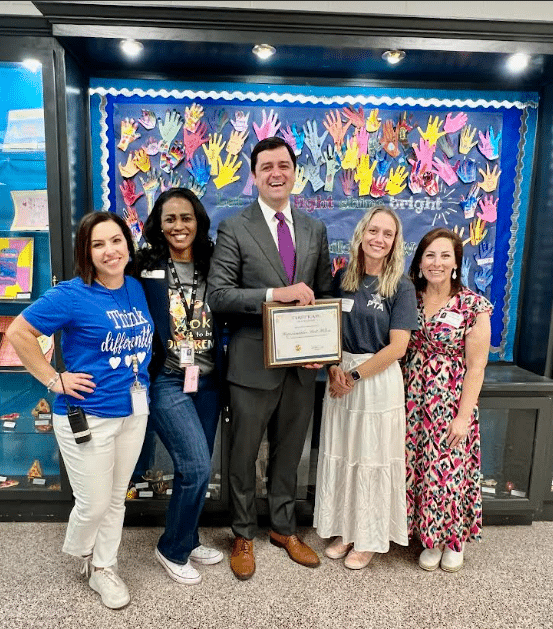
Simpson Elementary School celebrated Exceptional Children’s Week (ECW) last month with five days of special activities to recognize their special needs population and all of their exceptional students.
April 14–18 is set aside each year to celebrate children with disabilities, gifts and talents. This year’s ECW theme was Bridging Gaps and Building Futures, and the school was happy to take part.
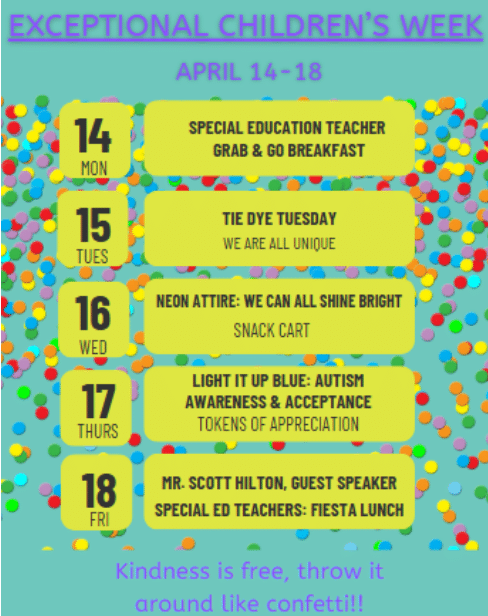
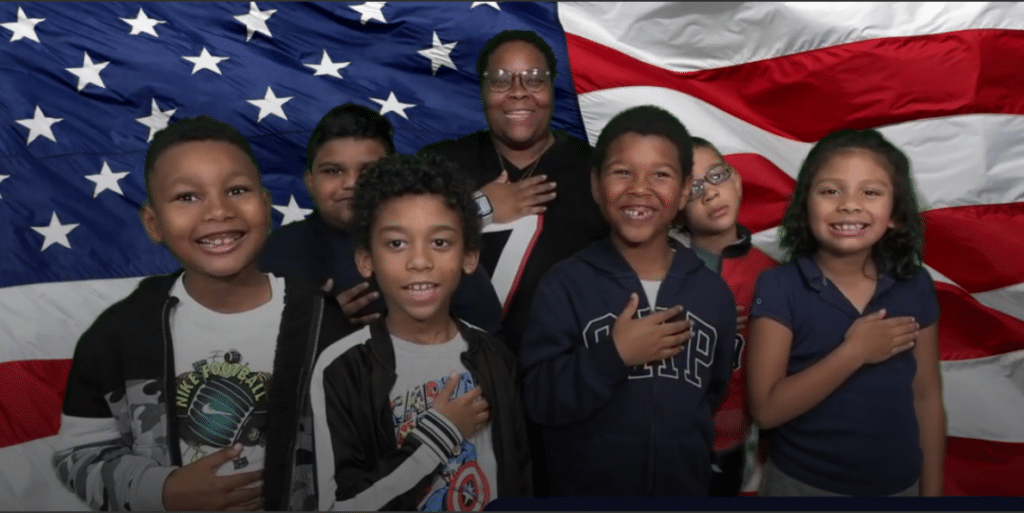
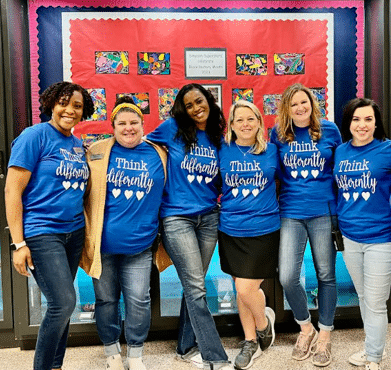
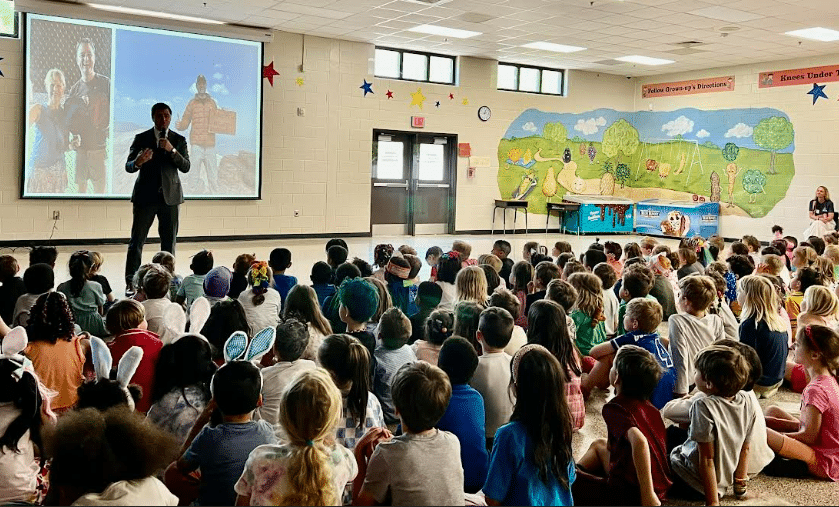
They highlighted each day of the week on the morning news with fun facts about notable people in society — and throughout history — who have overcome challenges with their disabilities, including actor Daniel Radcliffe (who has lived with dyspraxia for his entire life), Tom Cruise, Whoopi Goldberg, Frida Kahlo and Helen Keller.
Simpson Elementary’s technology team also pre-recorded various special needs classes reciting the Pledge of Allegiance every day of the week.
Guest speaker
To end their ECW with a bang, they invited former Simpson Elementary parent, State Representative Scott Hilton, to come in and speak to their K-2 classes about raising his son, Chase (who is autistic and now a student at Norcross High School), and how being different is okay.
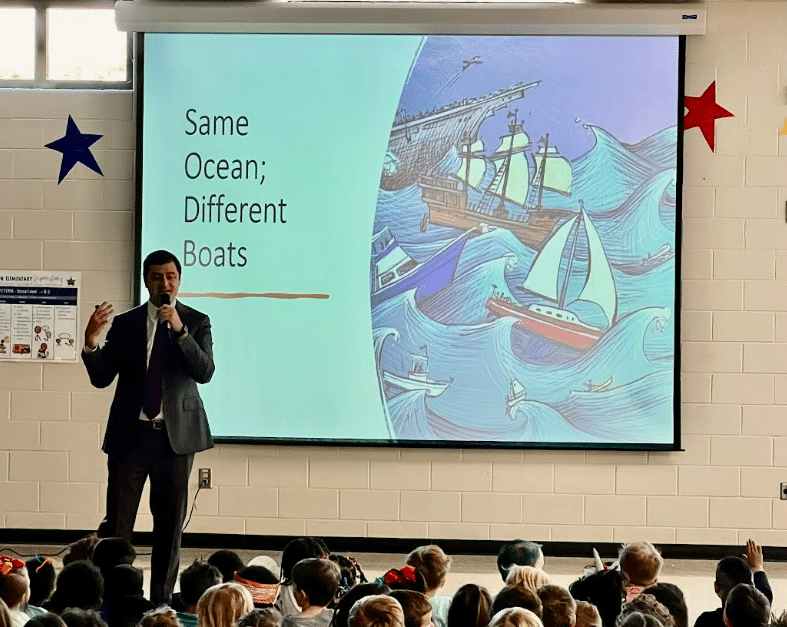
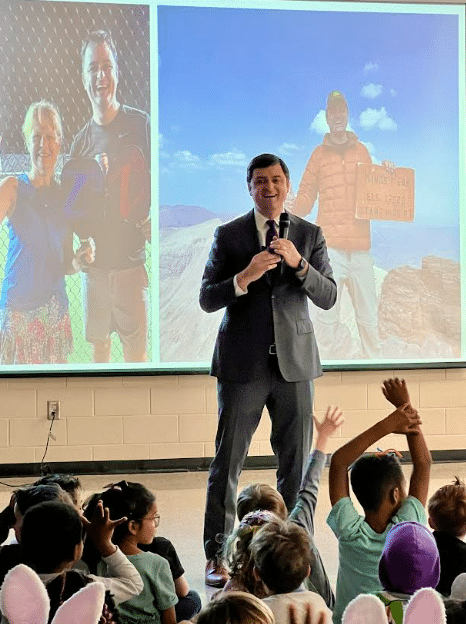
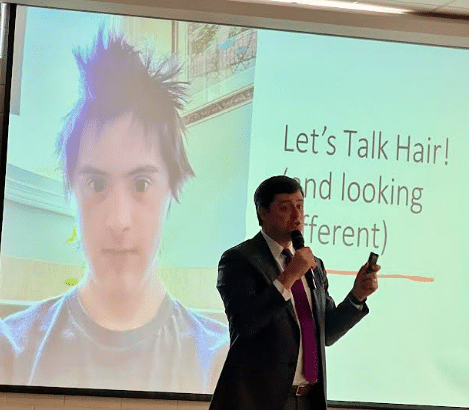
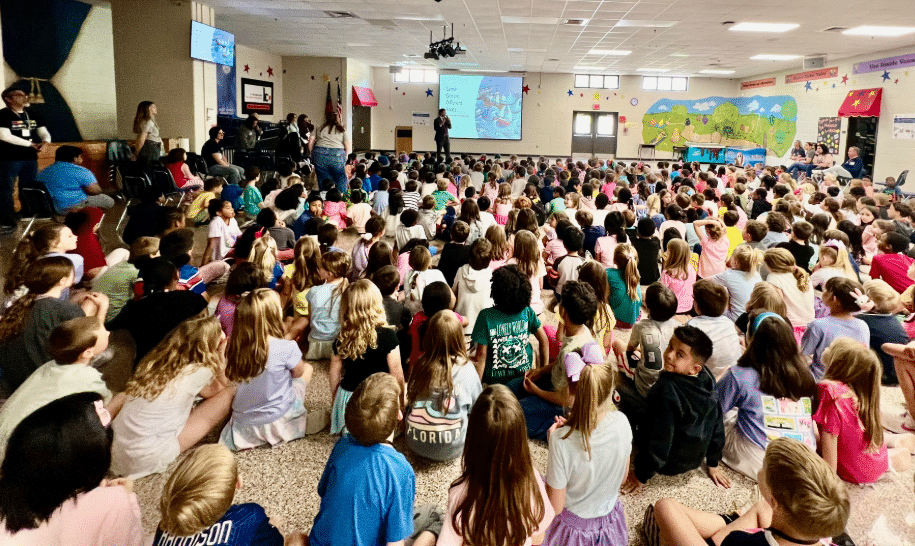
“Showing kindness and being inclusive is the best version of humanity,” said Dr. Taffeta Connery, Simpson Elementary School principal, in a statement about the event.
“Simpson Elementary has a special needs population of 214 (23%) of 946 students. [And] … we strive to ensure that our students are valued, recognized and instilled with high expectations for all.”
For more about Simpson Elementary, visit simpsones.gcpsk12.org.
Related
Education
Paul Duke STEM High School Student Earns CGO Scholarship
Published
7 days agoon
May 2, 2025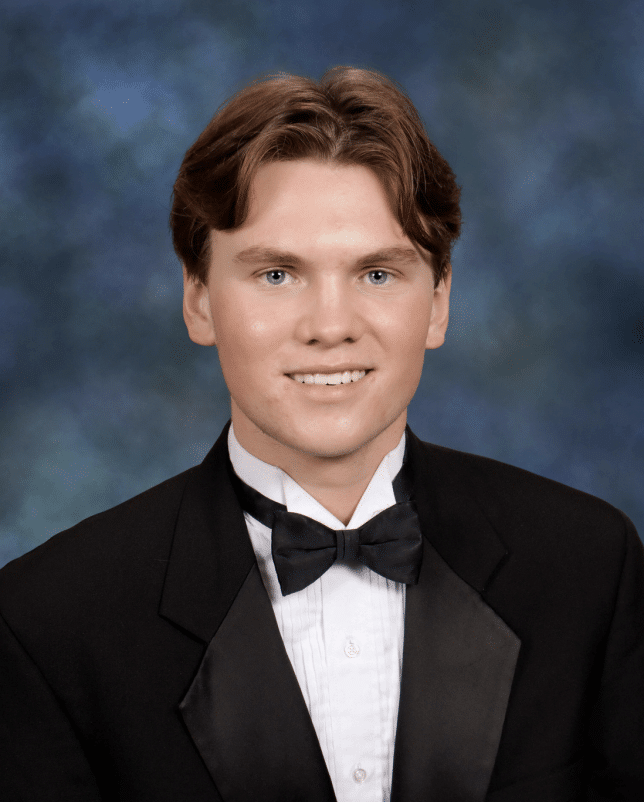
Cobb Global Outreach Inc. (CGO Inc.), a non-profit organization dedicated to enhancing financial literacy and educational opportunities, recently awarded three scholarships to metro Atlanta high school seniors, including one to Paul Duke STEM student, Baylor M. Brown.
The scholarship initiative underscores CGO Inc.’s commitment to empowering youth through financial education and support.
According to CGO’s social media pages, these outstanding students have shown incredible dedication and resilience in their academic journeys. “We are proud to support their continued success and look forward to seeing all that they will achieve!”
Scholarship details and impact
The scholarships provided by CGO Inc. are designed to alleviate financial barriers and encourage academic excellence among students pursuing higher education. Each scholarship recipient will receive financial assistance to support their educational endeavors, along with resources to enhance their understanding of financial management and literacy.
The scholarship recipients have demonstrated remarkable potential and a strong commitment to making a positive impact in their local community and beyond.
Bobby Cobb, CEO and founder of Cobb Global Outreach Inc., expressed enthusiasm about the partnership, stating, “We are honored to support the students … . By investing in their education and financial literacy, we aim to equip them with the skills necessary for a successful and financially secure future.”
Looking ahead
Cobb Global Outreach Inc. remains committed to expanding its scholarship programs and financial literacy initiatives. The organization plans to collaborate with additional schools and community partners to further its mission of closing the wealth gap and fostering economic empowerment among youth.
About Cobb Global Outreach Inc.
Founded in January 2021, Cobb Global Outreach Inc. is dedicated to educating middle and high school students about financial literacy. The organization believes that providing students with tools and resources related to financial literacy will help narrow the wealth gap and promote economic empowerment.
For more information, visit cobbglobaloutreachinc.com.
Related
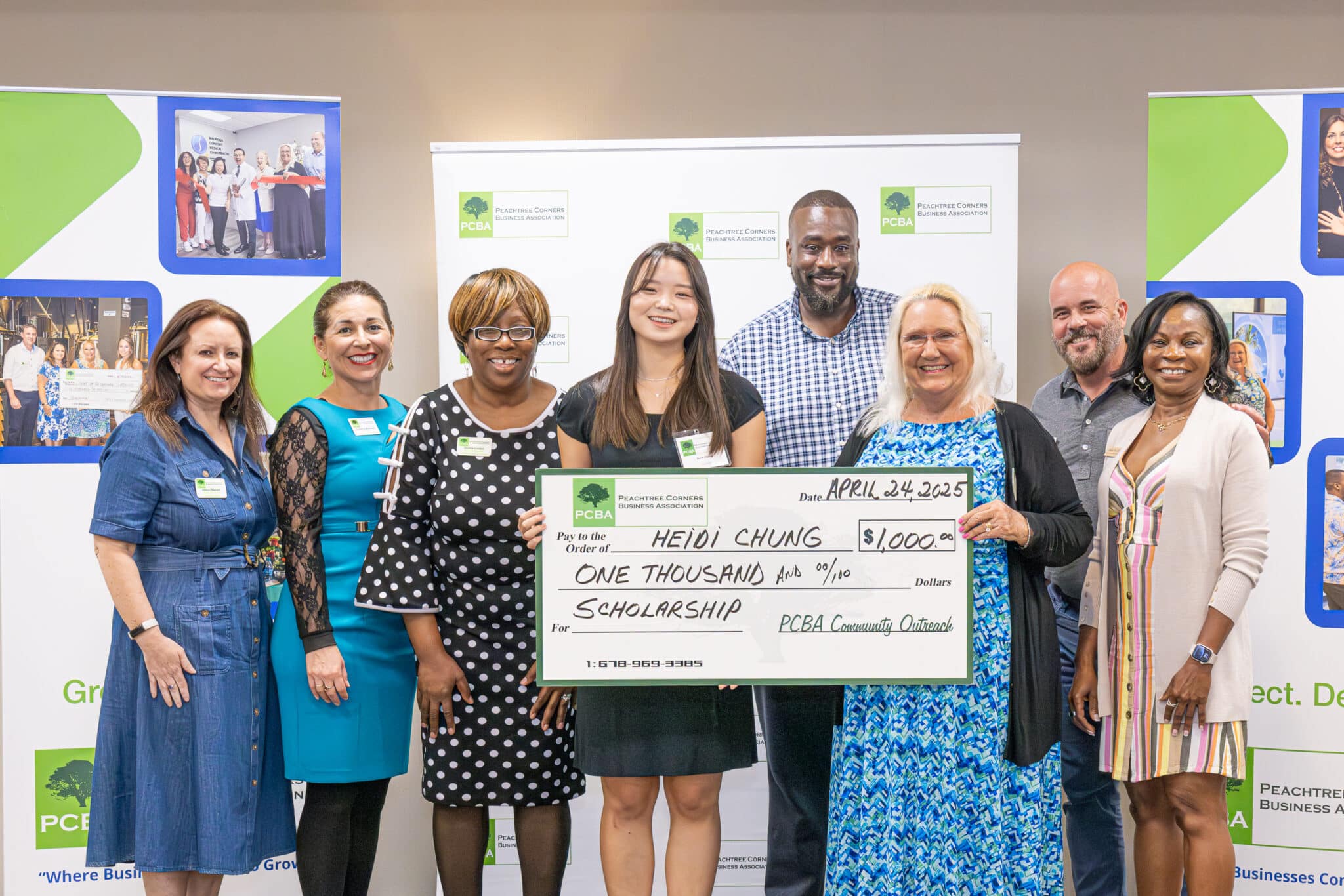
The Peachtree Corners Business Association (PCBA) awarded local high school senior, Heidi Chung, a $1,000 scholarship during their April 24 Business After Hours event. Heidi and her family were presented with the scholarship and introduced to the organization’s members and guests at the monthly gathering.
Heidi was accepted by several colleges and has selected the University of Kentucky to continue her education, pursuing a degree in nursing. When asked what lessons she has learned from her experiences volunteering and serving in the community throughout her life, Heidi commented, “I have learned that true leadership is about service, taking initiative and persevering through challenges.”
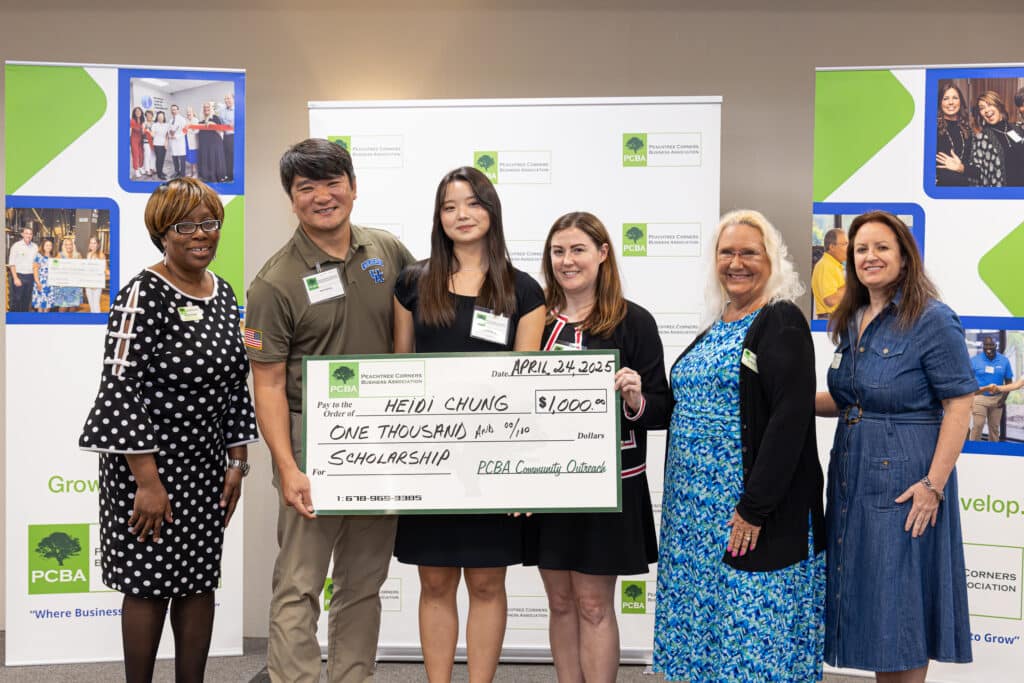
Scholarship Chair Donna Linden and Outreach Director Suzanna Martinez shared that the scholarship committee was impressed with Heidi’s many accomplishments, “whether she was organizing fundraisers, leading performance groups or helping athletes recover from injuries, Heidi demonstrated a positive impact on the community, as well as outstanding academic results.”
Funds for the PCBA Community Outreach Program are raised throughout the year from PCBA membership, sponsorship and an annual charity event. Donations and scholarships are awarded at PCBA’s monthly events so that members have the opportunity to learn more about the individuals and organizations.
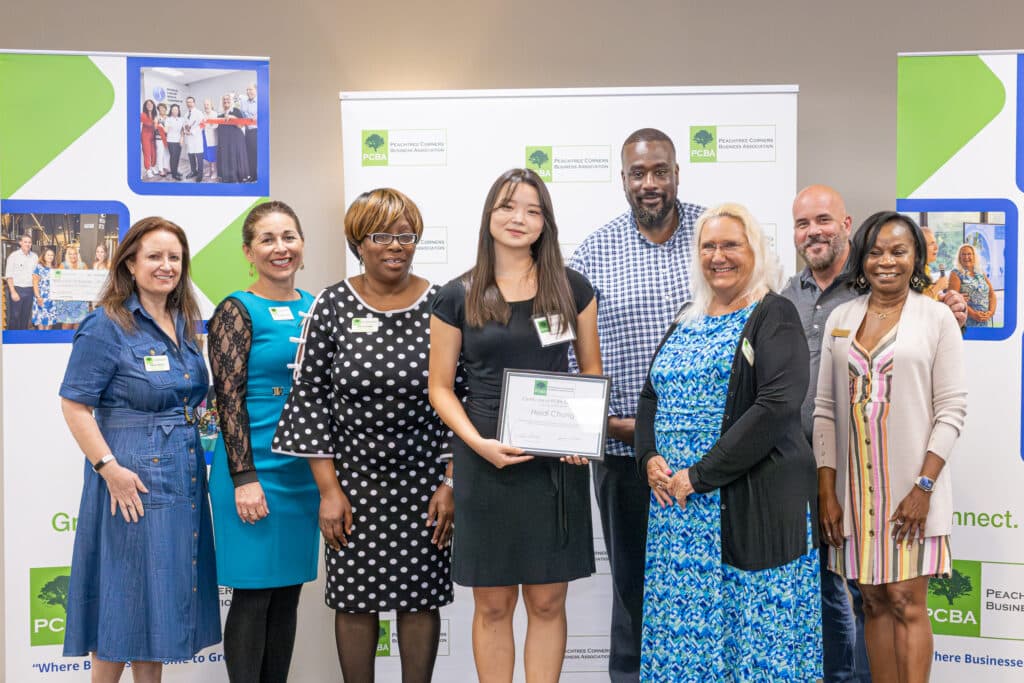
“We are so proud that the PCBA has … awarded 20 scholarships to outstanding future business leaders and donated in excess of $173,000 into our metro Atlanta community over the last 13 years,” stated Lisa Proctor, PCBA board president.
About Peachtree Corners Business Association
“Where Businesses Come to Grow,” the Peachtree Corners Business Association is a business membership organization that focuses on innovative approaches, programs, shared resources, community outreach and opportunities for member businesses and professionals to connect, develop, grow and prosper.
The PCBA is made up of businesses of all sizes and types who want to expand their reach and grow their business within Peachtree Corners and the greater metro Atlanta area.
For more information, call 678-969-3385, email membership@peachtreecornersba.com or visit peachtreecornersba.com.
Related
Read the Digital Edition
Subscribe
Keep Up With Peachtree Corners News
Join our mailing list to receive the latest news and updates from our team.
You have Successfully Subscribed!

GA Tech Launches First-of-its-Kind GT Atrium in Peachtree Corners

Katherine Lafourcade — A Journey of Passion, Resilience and Giving Back

Digital Edition

PCBA Announces 2025 Scholarship Winner

Paul Duke STEM High School Student Earns CGO Scholarship

World Blood Donor Day Starts Here: Theo’s Miracle, Katherine’s Mission [Podcast]

Peachtree Corners Grows Business Opportunities Through Economic Development

Executive Function: A Tribute to Working Moms

Simpson Elementary Marks Exceptional Children’s Week

Executive Function: A Tribute to Working Moms

Official City Merchandise Line Debuts This Saturday at Town Green

Peachtree Corners Grows Business Opportunities Through Economic Development

Digital Edition

World Blood Donor Day Starts Here: Theo’s Miracle, Katherine’s Mission [Podcast]

Paul Duke STEM High School Student Earns CGO Scholarship

PCBA Announces 2025 Scholarship Winner

Light up the Corners [Video]

Capitalist Sage: Business Leadership in Your Community [Podcast]

Cliff Bramble: A Culinary Adventure through Italy

Top 10 Brunch Places in Gwinnett County

A Hunger for Hospitality

THE CORNERS EPISODE 3 – BLAXICAN PART 1

Top 10 Indoor Things To Do This Winter

The ED Hour: What it takes to Remove Barriers from Education

Peachtree Corners Life
Topics and Categories
Trending
-
Digital Edition4 days ago
Digital Edition
-
Podcast4 days ago
World Blood Donor Day Starts Here: Theo’s Miracle, Katherine’s Mission [Podcast]
-
Business3 days ago
Peachtree Corners Grows Business Opportunities Through Economic Development
-
Community2 days ago
Executive Function: A Tribute to Working Moms







